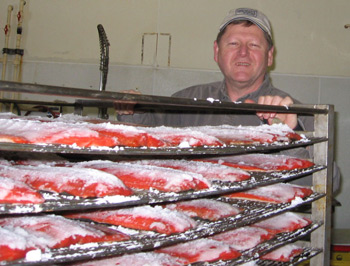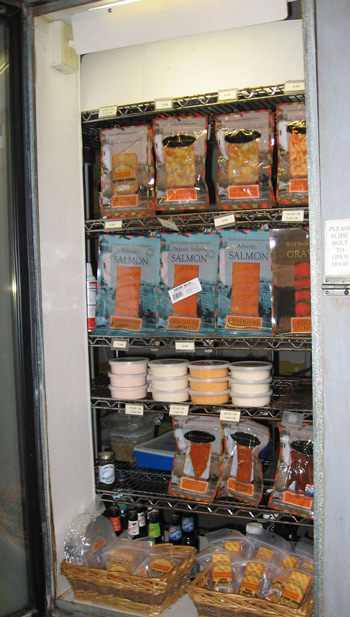Adding Value to Seafood
at Grindstone Neck
by Sandra Dinsmore

Carl Johnson at the Grindstone Neck of Maine smoke house with a rack of salted salmon. Johnson smokes both wild caught, organic farm raised, and farm raised salon. Photo by Sandra Dinsmore
Fishermen and fisheries co-ops increasingly find themselves looking into ways to take advantage of value-added products. By processing their raw product rather than selling it to a wholesaler or the public, they can end up with more money.
With that in mind, Fishermen’s Voice asked entrepreneur Carl Johnson, of Winter Harbor’s Grindstone Neck of Maine, how he started his value-added products business.
Johnson, a corporate chef with now almost 40 year’s experience, moved Gouldsboro in 1989. “It was a lifestyle decision,” he said, a good place to raise his then 10 and 11-year-old sons.
In 2000, Johnson opened his own restaurant in Winter Harbor, the Fishermen’s Inn. One of his specialties was a value-added cheese spread. To sharp cheddar cheese he bought, he added butter, sour cream, cream cheese, chives, and spices. The result was a firm cheese spread his customers also wanted to enjoy at home.
On a bench in the Fishermen’s Inn kitchen, Johnson started by packing his cheese spread in plain plastic containers using an ice cream scoop. He said, “I can do about two a minute and get the size right.” He used a kitchen scale to make sure the containers all weighed the same and called his spread’s Inn Cheese Spread.
A Culinary Institute of America graduate, Johnson has always been very particular about quality. In 2000, the cheese spread’s all-natural ingredients cost him $3 per lb. The finished product retailed for around $10 per lb. The ingredients cost more now, but the spread now retails for about $12 per lb.
He began selling his Fishermen’s Inn Cheese Spread to local markets, but when he tried to move beyond Gouldsboro, he ran into a problem. The name Fishermen’s Inn and cocktail glasses on the label were incongruous.
Johnson’s cheese spread needed a better name. “When you do a value-added product,” he said in retrospect, “You have to be careful about labeling and branding for the market you’re pitching to. If you’re selling to a supermarket, you have to have a marketable name.”
A dear friend came up with one that was just right for a Maine cheese spread: Betta Than Chedda. You can't beat that. It says it all.
In addition to buying cheese, Johnson had also been buying smoked seafood from other people, but said, “I knew right off the bat that I could make as good a product at a price that we could afford and not have to raise our prices.” In 2003, he bought a smoker. He rigged it to remove creosote by running the smoke through a water bath before it reaches the food.
Johnson also has a special way of smoking cheese. He cuts his cheese into the proportions he sells before smoking. “It takes longer,” he said. “But the results are worth it. Most companies that smoke, smoke the whole wheel. That means the smoke hits a lesser percentage of the cheese. The way we do it, the smoke hits 100 percent of the cheese.”
In 2003, when he started his website and started smoking cheese and salmon, it seemed a good time to change the name of the company. He took the name of a neck of land that houses Winter Harbor’s summer colony and incorporated his family business as Grindstone Neck of Maine.
Johnson’s wife, Kathy, took over deliveries and troubleshooting. Son Mason, now 32, started as a pot scrubber at 14. He has 20 years’ experience in all aspects of the food business. He works with Carl, does photography and helps design product packaging and labels. He specializes in wholesale distribution and marketing. Son Matthew, now 31, works in sales and customer service, and helps his mother with deliveries. “We simply can’t deliver the quality expected without the help of our fellow employees,” Carl said. “They're an invaluable part of making the whole thing work.”

One of the display case coolers in the retail store at the Johnson's smoke house. The Johnsons now sell 20 different food items and up to 40 variants of these twenty foods. For instance, they do Atlantic salmon packed unsliced and sliced in four different sizes. Photo by Sandra Dinsmore
The Johnsons do as much of the packaging of their products as possible. In fact, they do as much of every part of the business they can. It saves money. For instance, they make their own labels. “We invested in printers and computers,” Carl said. “Packaging is an enormously expensive part of the business.”
Mason explained, “When you’re in the raw form of the business, you don’t have these overhead costs. Small business people don’t have to have thousands of dollars in design work and product sitting in a warehouse. You supply what you need,” he said. “You don’t have to rely on outside sources. It’s an aspect of the business, when you get into a value-added product, that you can't foresee, and there’s no one telling you how to do this. There are a lot of stumbling blocks.”
Mason brought out a file showing how their packaging developed from the first clear plastic pouch with a rubber Fishermen’s Inn stamp to the present one with a photograph of the Maine coast as a background, colors, the company’s striped border, and resealable zipper closure and tear notch. “We work with our customers,” Carl said, “both wholesale and retail.”
“We had to have something different,” he went on. “You have to have a niche; you need to know what you want to do with your product.”
Mason and Carl agree, it’s easier to deal with wholesale people than with retail customers. Mason advised, “It’s so much easier to value-add your product and sell it to a retailer than to an end user. We can put out a hundred retail orders or ten wholesale orders for the same amount, or less.” They both agree, though, that they need retail sales to get the product name out and to help pay the bills.
The Johnsons now import their seafood pouches, which in late December were sitting in Customs Hold. Frustrated, Mason advised, “Don’t expand beyond your means because you want to be able to fulfill your orders. If you have a very large customer and you can't fulfill that order, you just lost a very large customer.”
They recently learned how to import equipment and goods from overseas without going through middlemen. Learning the ropes was hard for them, but it was important because as Carl explained, it all comes down to high US wages versus foreign labor. “For me to move one pallet of goods from New Jersey to Maine is $500,” he said. “To ship one pallet from China to Boston is $220.”
The Johnsons work with another area businessman. They order things together and buy products from each other they don’t produce themselves. They don‘t step on each other’s toes; rather, by helping each other, they both make money.
The Johnsons now sell 20 different food items and up to 40 variants of these 20 foods. For instance, they do Atlantic salmon packed unsliced and sliced in four different sizes.
They have organic Scottish Atlantic, wild Alaskan, and wild Alaskan Sockeye salmon, and Wild Pacific, and their Atlantic salmon comes smoked in six different ways: classic hardwood, Cajun, Pas- trami, Maple Pepper, Zesty Pepper, and Scotch Whiskey.
They do these variants, Carl said, “because you have to bend. You have to be flexible for your customer. Flexibility is the key.”
To their smoked salmon varieties, they added smoked shrimp, scallops, mussels, trout smoked in Plain or Maple Pepper, and haddock. Their website www.grindstoneneck.com, makes clear they do not use genetically modified seafood, Liquid Smoke, preservatives, or colorants.
The Johnsons now sell their renamed and repackaged Betta Than Chedda cheese spread in every state via the web. Wholesale sales, though, are limited to their shipping area. Over the Christmas holidays, they sold 500 containers a week of the original flavor alone.
Carl has also created cheese spreads in Smoked Salmon, Smoky Horseradish, Beer Cheese and Blueberry Sunshine: made from cream cheese, yogurt, blueberries and blueberry honey, and lemon juice. And he has three more spread varieties in the works. But those are just the cheese spreads, all developed from the original product. He also has a smoked cheddar and a smoked blue cheese. He said his smoked blue is one of only two smoked blue cheeses made in this country.
And best of all, the business has grown. Carl designed a new plant himself and bought a parcel of land on Route 1 at the junction of Route 186 to Winter Harbor. Grindstone Neck of Maine will be moving five miles up the road where their smokehouse and gift shop will have six times the traffic. All the planning and smoking and packaging of their gourmet foods has paid off. The Johnson family has succeeded in its business plan; its rural Maine smokehouse is moving on up to the big time.
